Man Accepts For His Roommate To Get An Extra Cat, Regrets His Decisions Later On
When considering the addition of a cat to your home, it is important to decide whether to acquire one or two. Of course, everyone will have a different answer, and having two cats instead of one can require more work.
Having two cats can be beneficial since they will keep each other company while you are away. Your cat won't receive much cerebral stimulation if you are gone at work for a significant part of the day.
Two cats can connect with one another, preventing loneliness or sadness. This is especially important when adopting a kitten, as they need to play or exercise frequently to build strong muscles and require attention.
The ideal scenario is to raise kittens from the same litter. This is because they will already be familiar with one another, and there shouldn't be any issues keeping them close by.
The OP of today's story is not a big fan of cats, but his roommate has an emotional support cat. They are cute, in theory, to the OP, but they climb on everything and get in the way.
The roommate's cat wasn't so bad, but it died, and his roommate got another cat. It didn't stop there, as the roommate wants to get a second cat so it won't be lonely on days when they have to work late.
This was a huge problem for the OP, as these cats would certainly invade his space and ruin things for him.
The story kicks off but not without the headline

The cat suddenly suffered a cardiac arrest while the OP's roommate was playing with it
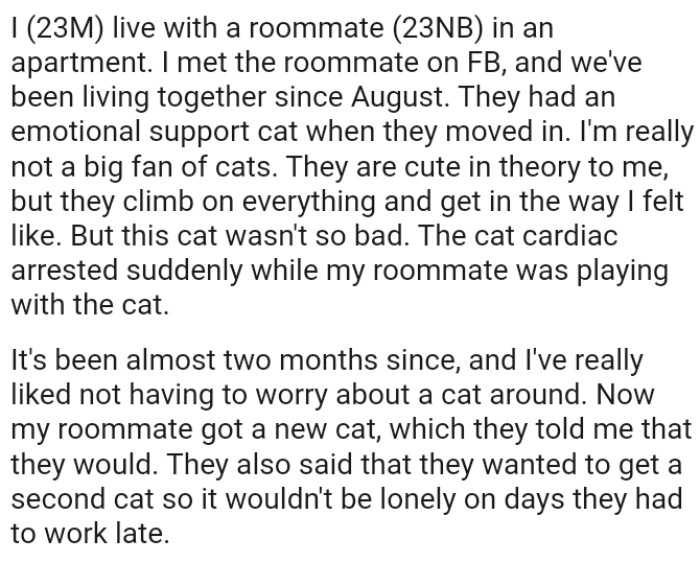
They wanted to take the cat to the vet and learn more about it to inform adoption agencies
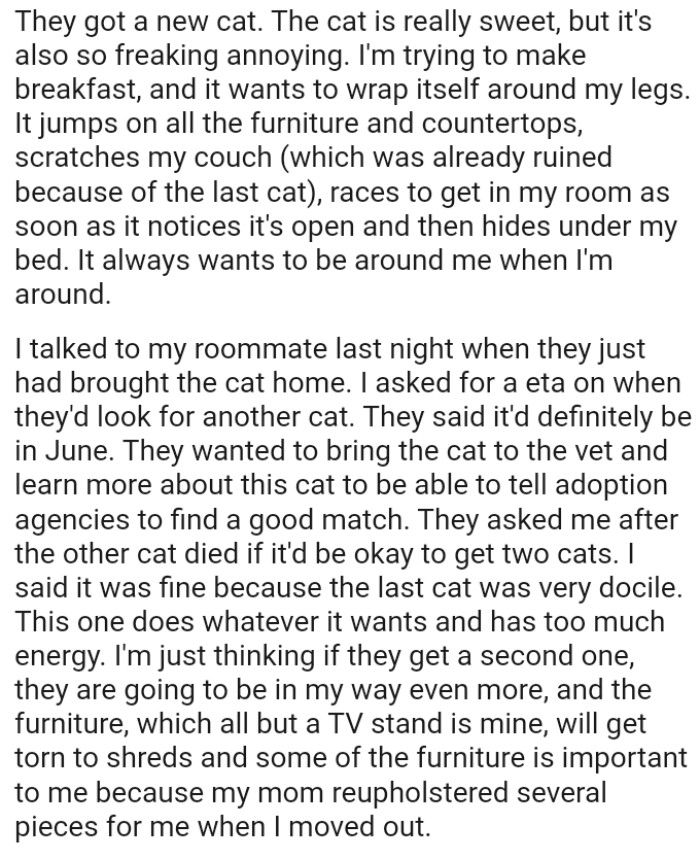
The Psychology of Regret in Decision-Making
Dr. Laura Simmons, a behavioral economist at the University of Chicago, explores how our decision-making processes often lead to feelings of regret when outcomes don't match expectations.
In shared living situations, impulsive decisions, such as accepting a new pet, can result in unforeseen consequences that amplify these feelings.
Understanding this psychology can help individuals make more informed and reflective choices in the future.
The Dynamics of Shared Responsibilities
This situation underscores the complexities involved in sharing responsibilities in a roommate relationship, particularly regarding pet ownership.
Research indicates that shared living situations require clear expectations to avoid misunderstandings and resentment.
When one party feels overwhelmed by additional responsibilities, it can lead to significant conflict and regret, as seen in this scenario.
Let's head into the comments and find out what other Redditors have to say regarding this story

The OP should go ahead and talk to his roommates about his concerns

The OP is concerned that a second cat will worsen the situation
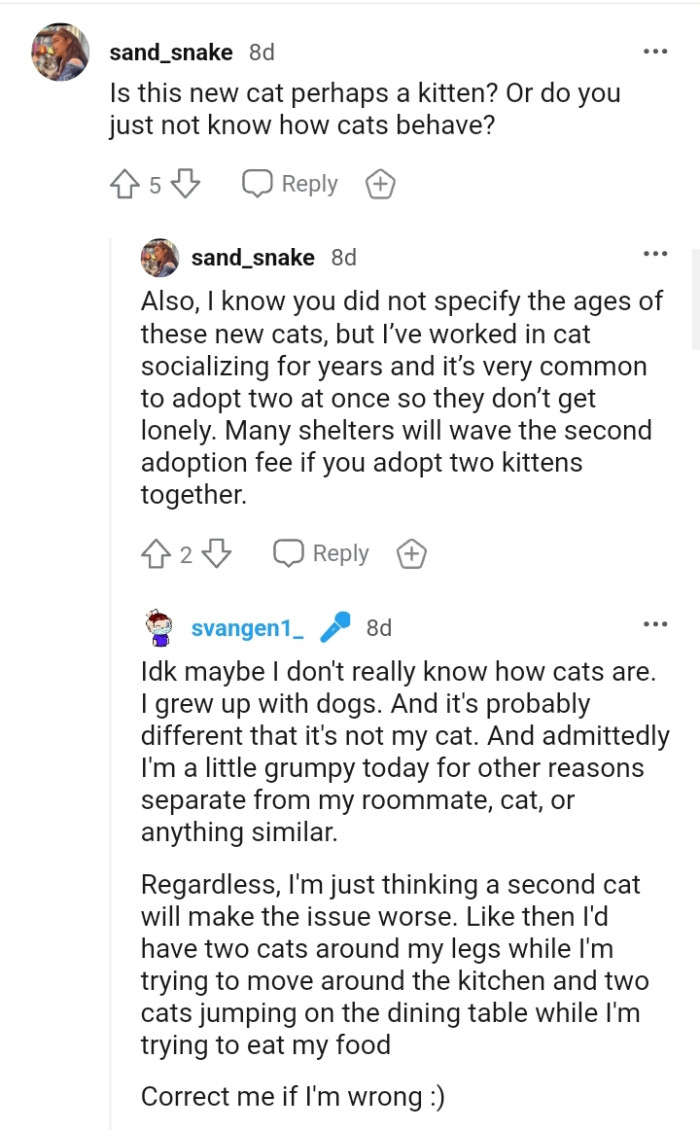
Research by Dr. Dan Siegel, a renowned psychiatrist, highlights that individuals often face cognitive dissonance when their decisions lead to unfavorable outcomes. He states, "When our choices conflict with our values or expectations, it can create a significant emotional burden." This dissonance frequently results in feelings of regret and dissatisfaction, especially when such decisions affect the comfort and quality of living environments.
Psychological studies show that stress and burden-sharing are critical components in maintaining harmonious cohabitation.
When one roommate takes on more than their fair share, it can lead to feelings of imbalance and resentment, which can deteriorate the relationship over time.
In this case, the man's regret suggests a misalignment of expectations regarding pet care responsibilities.
"A cat will be hyper like this and scratch furniture when it does not have enough stimulation"
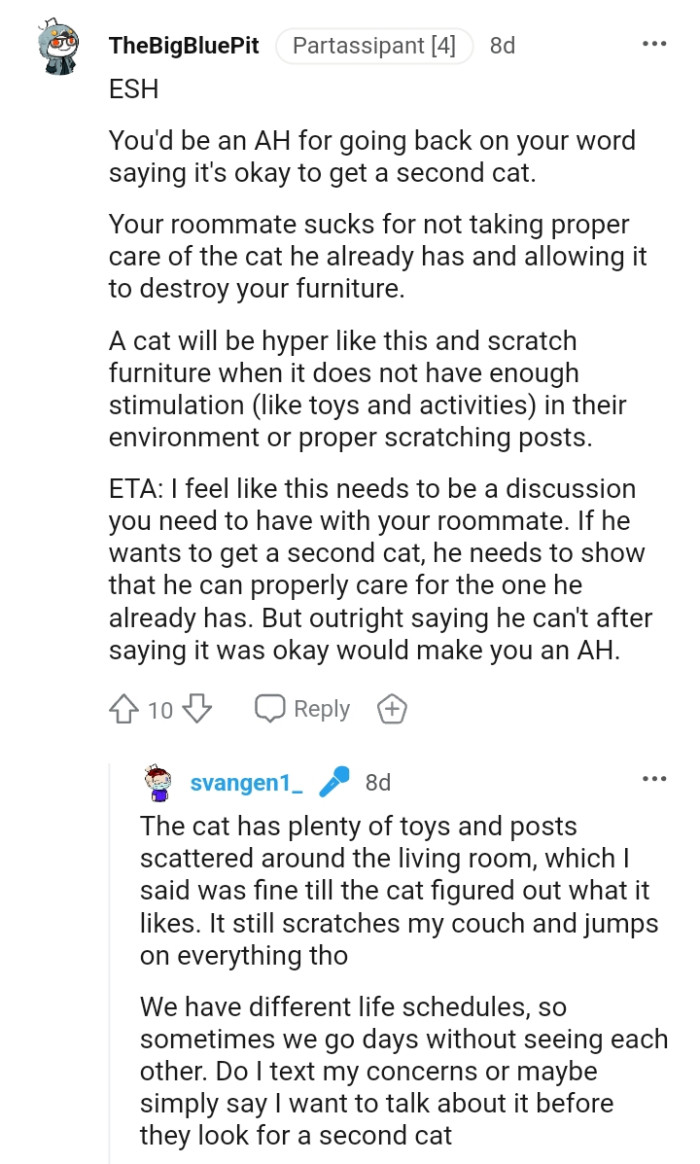
How responsible the roommate is with a pet is a good starting point
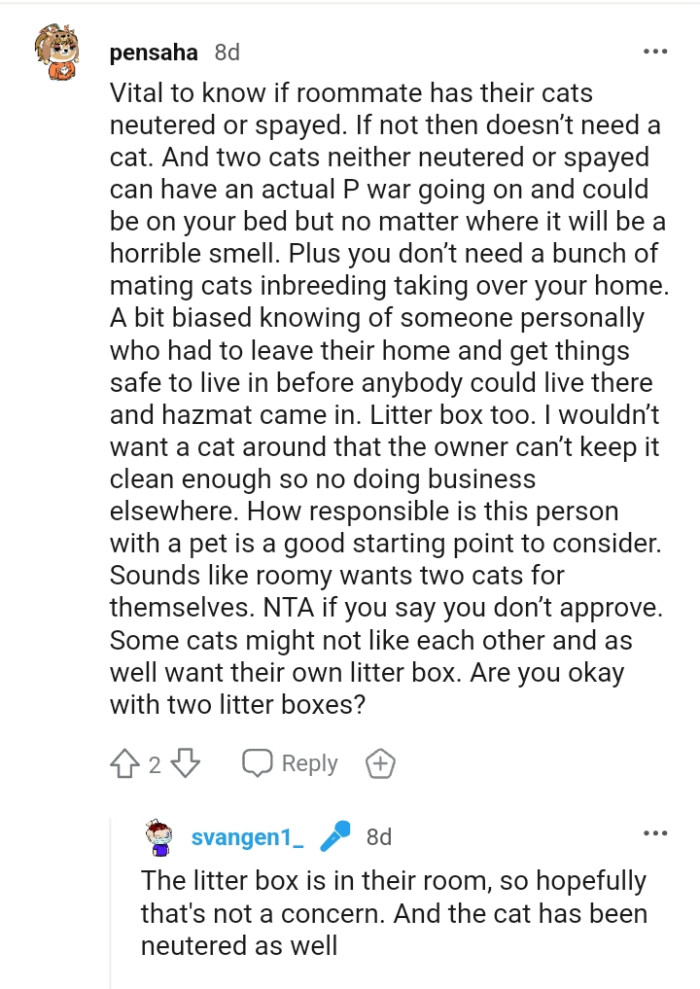
It's their support animal, but does the support animal really need a support animal?

Managing Expectations in Shared Living
Setting realistic expectations is crucial in roommate dynamics, particularly regarding shared responsibilities and accommodations.
Behavioral psychologists suggest that clear communication about needs and preferences can prevent misunderstandings and foster a cooperative environment.
Research shows that discussing potential changes before they happen can help manage expectations and ease transitions.
Effective Communication in Roommate Dynamics
Effective communication is key to navigating shared responsibilities and preventing regrets in roommate situations.
Experts recommend having open discussions about each person's comfort level and capacity for pet care, which can help clarify expectations.
Setting boundaries and responsibilities from the start can foster a more equitable living arrangement.
Telling them he doesn't want a second one due to the behavior of the first one

The OP pays half the bills and has the right to express his concerns

The OP should let them know that any damage caused by the cats is solely their responsibility

To avoid feelings of regret in shared living decisions, experts recommend establishing a trial period for new arrangements, such as adding a pet.
This allows roommates to assess the impact of such changes before committing long-term.
Regular check-ins can also help roommates voice concerns and adjust arrangements as needed.
Furthermore, employing collaborative decision-making can help ensure that all roommates feel heard and respected.
Research in group dynamics shows that involving everyone in decisions related to shared responsibilities can lead to greater satisfaction and lower conflict rates.
This approach can create a sense of teamwork and mutual support among roommates.
There may initially be a degree of aloofness or even aggressiveness when introducing two cats or kittens that have never met, but this typically passes quickly. Some Redditors mentioned that just because someone is okay with something at one point in time does not mean they are forever bound to be okay with it in the future.
In the end, the OP's story received an "everyone sucks" verdict.
Understanding the Impact of Regret
Regret is a complex emotion that can stem from feeling trapped in a situation that no longer meets one's needs.
Studies indicate that regret can lead to increased anxiety and dissatisfaction, particularly in shared living arrangements.
Addressing feelings of regret early on can prevent further conflict and create opportunities for constructive change.
Psychological Analysis
This situation highlights the challenges of shared responsibilities in roommate relationships.
Understanding and communicating about these responsibilities is essential for maintaining a positive living environment.
Analysis generated by AI
Analysis & Alternative Approaches
Ultimately, successful roommate relationships hinge on clear communication, shared responsibilities, and mutual respect.
Research supports that addressing concerns and expectations early can prevent conflict and promote a harmonious living environment.
As such, roommates should regularly check in with each other to ensure that everyone's needs are being met.
The Emotional Toll of Co-habitation Decisions
Choosing to share living spaces can lead to emotional stress, particularly when unexpected responsibilities arise.
Research shows that individuals often feel pressured to accommodate others, leading to feelings of resentment if their own needs are overlooked.
Recognizing these emotional factors can empower roommates to advocate for their own needs while still fostering a supportive environment.
Psychological Analysis
This situation demonstrates how quickly decisions regarding shared living can lead to emotional turmoil.
It's essential for individuals to weigh the potential impacts of their choices and maintain open communication to mitigate feelings of regret.
Analysis generated by AI
Analysis & Alternative Approaches
Impulsive decisions in shared living situations can lead to regret and dissatisfaction among roommates.
Research highlights the importance of managing expectations and clear communication to create a harmonious living environment.



